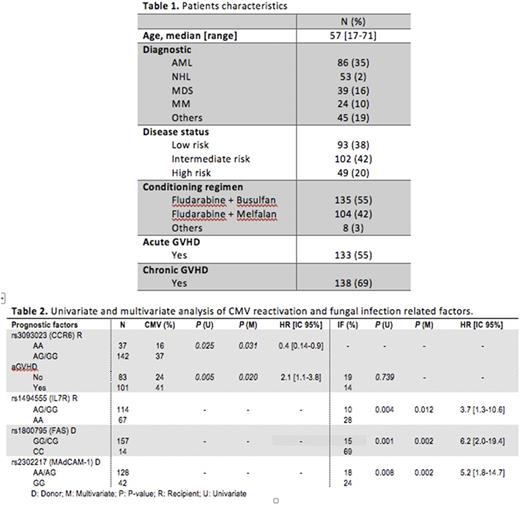Abstract
INTRODUCTION: Infection complications are important cause of morbidity and non-relapse mortality after allogeneic hematopoietic stem cell transplantation (allo-SCT), even in HLA-identical sibling donors. Although there are many studies associating single nucleotide polymorphisms (SNPs) and allo-SCT evolution, these are mainly related with graft versus host disease (GVHD) and/or transplant related mortality (TRM), with few focused on post-allo-SCT infections. This multicentric study analyzes the potential implication of SNPs with cytomegalovirus (CMV) reactivation and fungal infection (FI) development in allo-SCT with reduced intensity conditioning (RIC).
MATERIALS AND METHODS: We included paired recipient-donor samples from 247 RIC allo-SCT for patients diagnosed of AML (35%), NHL (21%), MDS (16%), MM (10%), CLL (7%), HL (6%), or others (5%) in four centers in Spain. Flu-Bu conditioning was used in 55% of the transplants while Flu-Mel in 42%. A total of 52 SNP were analyzed from 44 different gene loci and genotyping was carried out by Sequenom Mass ARRAY platform. Allele frequencies were estimated by direct counting and compared between groups using Fisher's test. P-value <0.05 was considered to be statistically significant. Log-rank analysis was used to compare differences between survival curves.
RESULTS: Patient's characteristics are shown in Table 1. The median follow up for patients was 28 months (1-175), overall survival at 5 years was 45%, while the event-free survival at 5 years was 57%. Cumulative incidence of CMV reactivation at 3 years was 34% and of FI 11%. Transplant related mortality was 17%, and infection related mortality 14%.
In univariate analysis, patients with genotype A/A in rs3093023 (CCR6) showed a lower incidence of CMV reactivation (table 2), along with acute GVHD were the variables associated in multivariate analysis.
Regarding to FI, recipient genotype A/A in rs1494555 (IL7R), donor C/C in rs1800795 (FAS), and donor G/G in rs2302217 (MAdCAM-1) were associated with higher FI incidence (table 2), being the only variables related in multivariate analysis.
CONCLUSION: This data suggest an association between rs3093023 (CCR6), rs1494555 (IL7R), rs1800795 (FAS) and rs2302217 (MAdCAM-1) polymorphisms with higher incidence of post-allo-SCT opportunist infection. Confirmation in larger series is required.
FUNDING: RD12/0036/0069, CB16/12/00233 and 00480, PI12/02361 and ERDF, Innocampus; CEI-2010- 1-0010
No relevant conflicts of interest to declare.
Author notes
Asterisk with author names denotes non-ASH members.


This feature is available to Subscribers Only
Sign In or Create an Account Close Modal